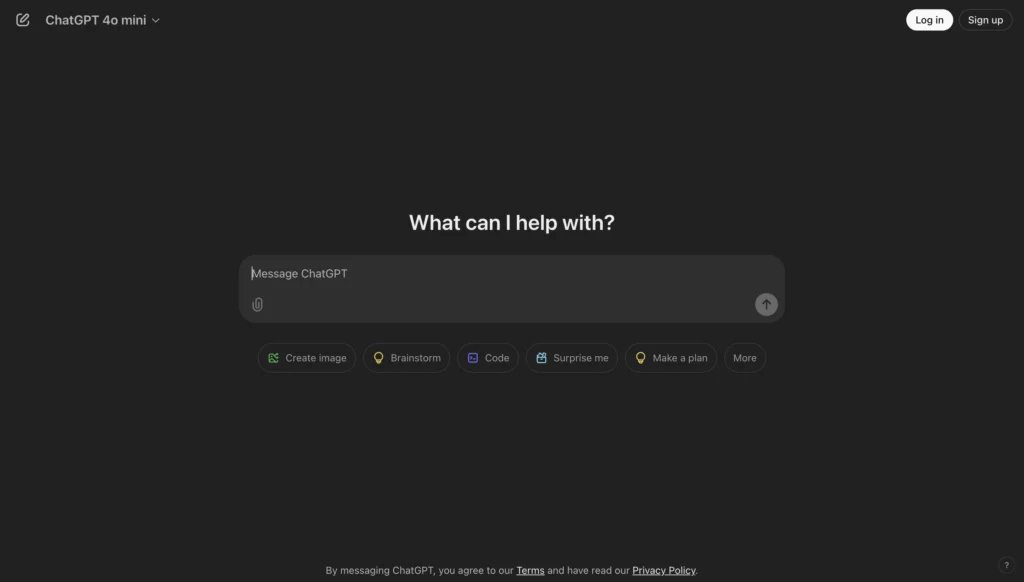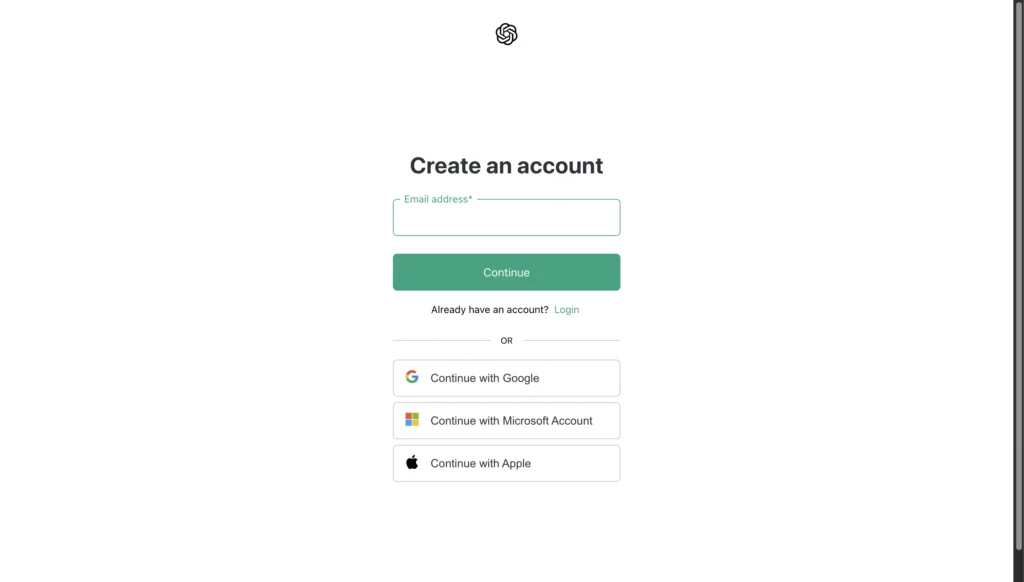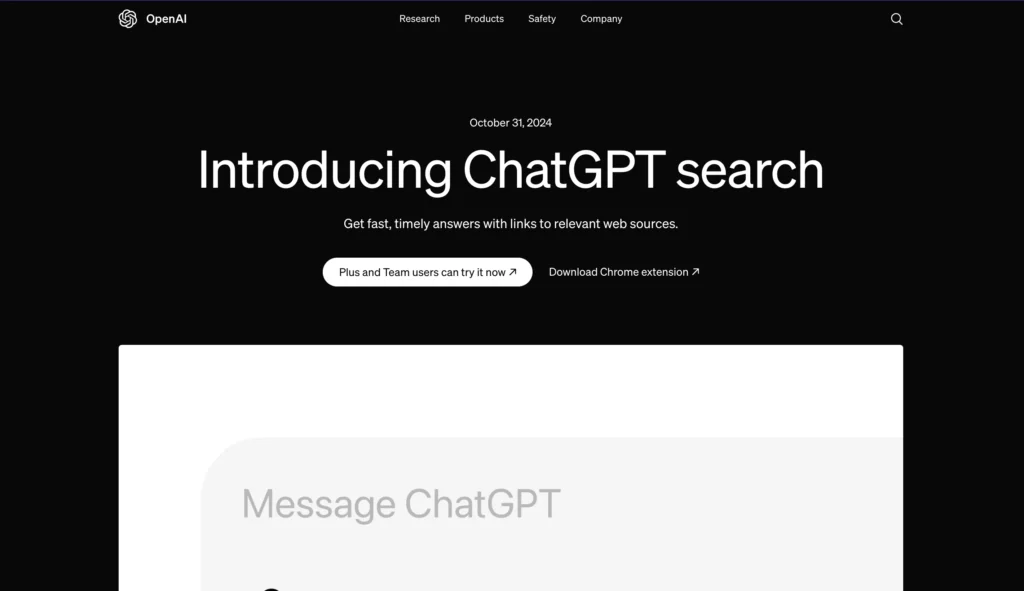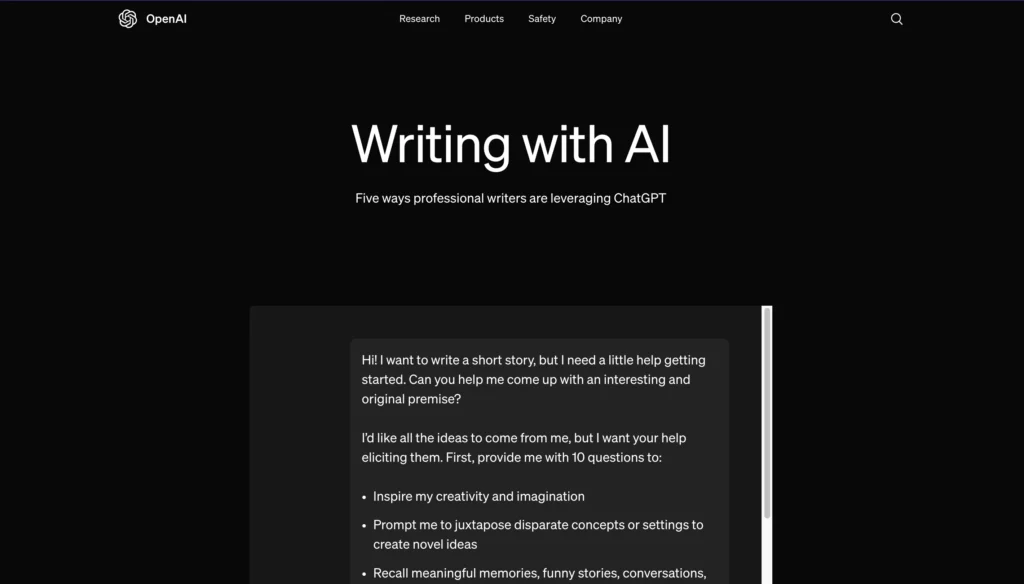The Best 50 smart SEO prompts for ChatGPT Free

Table of Contents
1. Introducing Smart SEO Prompts
In the ever-evolving AI landscape, search engine optimization (SEO) remains a cornerstone of online visibility. With competition increasing daily, professionals are constantly seeking innovative ways to optimize their strategies and achieve better rankings. This is where ChatGPT, a powerful AI language model developed by OpenAI, comes into play. This guide covers “50 Smart SEO Prompts for ChatGPT”, a carefully curated list of actionable suggestions that will revolutionize your SEO efforts.
Whether you’re looking to dominate search engine rankings, create compelling content, or discover untapped keyword opportunities, these prompts provide a roadmap to success. Prepare to elevate your SEO game to the next level with the power of AI!

2. The Ultimate List of 50 Smart SEO Prompts
Here’s a categorized breakdown of the 50 Smart SEO Prompts for ChatGPT, designed to simplify your SEO tasks and make your efforts more efficient.
a. Keyword Research Prompts
Keyword research is the foundation of any successful SEO strategy. These prompts help you identify high-value keywords for your niche:
-
- Generate a list of related keywords for [TOPIC].
- Identify long-tail keywords for [TOPIC] content optimization.
- Find top-performing keywords for [TOPIC].
- Discover keywords with low competition for [TOPIC].
- Find keywords with low competition for [TOPIC].
- Create a list of synonyms and LSI (Latent Semantic Indexing) keywords for [TOPIC].
- Generate a list of synonyms for [TOPIC] keywords.
- Research the best keywords for [TOPIC] PPC campaigns.
- Identify keywords for [TOPIC] targeting featured snippets
- Research industry-specific terminology for use in [TOPIC] content.
Use Case: For a blog on “best travel destinations,” use prompts to uncover related terms like “family-friendly travel spots,” “affordable vacation ideas,” or “off-the-beaten-path locations.”
b. Content Creation Prompts
High-quality, optimized content drives traffic. These prompts help generate ideas, descriptions, and tags to elevate your content:
-
- Create meta descriptions and title tags for [TOPIC].
- Generate blog post ideas and article topics on [TOPIC].
- Research industry-specific terminology for use in [TOPIC] content.
- Generate a list of alt tags for images related to [TOPIC].
- Generate ideas for blog posts and article topics on [TOPIC].
- Identify questions people frequently ask about [TOPIC] to create FAQ sections.
- Create a list of the best alt tags for images related to [TOPIC].
- Generate a list of questions people ask about [TOPIC].
- Find popular content topics related to [TOPIC].
- Find the best time to publish content related to [TOPIC]
Use Case: For an e-commerce site selling eco-friendly products, use prompts to create engaging meta descriptions and blog topics like “10 Sustainable Products for Everyday Use.”
c. Optimization Prompts
SEO optimization ensures your content is easily discoverable and performs well on search engines. These prompts focus on technical and strategic enhancements:
-
- Research the best meta tags for [TOPIC].
- Create an XML sitemap example related to [TOPIC].
- Research schema markup suggestions for [TOPIC].
- Research the best tactics for [TOPIC] mobile optimization.
- Find the best keywords for [TOPIC] voice search optimization.
- Optimize keywords for [TOPIC] video and e-commerce content.
- Research AMP optimization strategies for [TOPIC].
- Find the best strategies for local SEO related to [TOPIC].
- Research the best schema markup for [TOPIC].
- Find the best header tags for [TOPIC] content.
Use Case: For local businesses, prompts like “Research the best tactics for [TOPIC] Google My Business optimization” can help improve visibility on local search results.
d. Link Building Prompts
Building a strong backlink profile and internal link structure is crucial for SEO success. These prompts streamline your link-building efforts:
-
- Identify opportunities for internal linking related to [TOPIC]
- Find opportunities for internal linking related to [TOPIC].
- Research the best anchor text for [TOPIC] backlinks.
- Generate ideas for link-building partnerships related to [TOPIC].
- Find authoritative websites to acquire backlinks for [TOPIC] content.
- Create a list of potential guest blogging opportunities for [TOPIC].
- Create a list of potential partnerships for [TOPIC].
- Identify influencers and brands that could link back to [TOPIC] content
- Research the best external linking strategies for [TOPIC].
- Recommend top link building tools.
Use Case: A fitness blogger can use prompts to identify guest blogging opportunities on health and wellness sites or build partnerships with fitness equipment brands.
e. Advanced SEO Prompts
For experienced SEO professionals, these prompts help tackle complex strategies and niche-specific tasks:
-
- Create a list of potential podcast or webinar ideas related to [TOPIC].
- Identify industry-specific hashtags related to [TOPIC].
- Research the best SEO tactics for international optimization of [TOPIC].
- Create keyword lists targeting different geographic regions for [TOPIC].
- Create an example keyword list targeting multiple geographic locations for [TOPIC].
- Generate keyword ideas targeting different stages of the customer purchase funnel for [TOPIC].
- Create a list of categories for my blogs [CATEGORY]
- Research competitor strategies related to [TOPIC].
- Research the best tactics for [TOPIC] international SEO.
- Find canonical tag examples related to [TOPIC].
Use Case: For an international online store, use “Research the best tactics for [TOPIC] international SEO” to optimize content for multiple regions and languages.

3. Why Use ChatGPT for SEO?
The integration of AI tools like ChatGPT into SEO workflows has revolutionized how professionals approach search engine optimization. Here’s why our list of 50 smart seo prompts for chatgpt is a powerful ally in your SEO strategy:
a. Benefits of Leveraging AI in Keyword Research, Content Creation, and Link Building
-
- Efficient Keyword Research:
ChatGPT can quickly generate a comprehensive list of related, long-tail, and low-competition keywords for any topic, saving hours of manual research. It also suggests keywords tailored to specific niches or customer intents, ensuring a more targeted approach. - Enhanced Content Creation:
Crafting engaging and SEO-optimized content becomes easier with ChatGPT. From blog ideas and meta descriptions to detailed article outlines, ChatGPT provides creative and structured content suggestions that align with user intent and search engine guidelines. - Streamlined Link Building:
Finding opportunities for internal and external linking is a breeze with AI. ChatGPT can identify relevant anchor texts, suggest potential backlink sources, and even generate ideas for guest blogging topics that align with your SEO goals
- Efficient Keyword Research:
b. How ChatGPT Saves Time and Provides Fresh Ideas
-
- Automating Repetitive Tasks:
Tasks like creating meta descriptions, alt tags, or internal linking structures often consume significant time. ChatGPT automates these processes, allowing SEO professionals to focus on strategy and execution. - Idea Generation at Scale:
SEO often requires brainstorming new content ideas or approaches. ChatGPT can provide an endless stream of fresh ideas for blog posts, social media topics, or video scripts, ensuring you never run out of inspiration. - Quick Data Analysis:
ChatGPT simplifies interpreting industry jargon or analyzing competitor strategies. By summarizing complex data into actionable insights, it reduces the learning curve for beginners and accelerates decision-making for experts.
- Automating Repetitive Tasks:
c. Examples of SEO Tasks Simplified by ChatGPT Prompts
-
- Content Optimization:
Use prompts like “Generate a list of long-tail keywords for [topic]” or “Create meta descriptions for [topic]” to optimize existing content for better ranking. - Backlink Strategy:
With prompts like “Find authoritative websites for backlinks related to [topic]”, ChatGPT helps pinpoint high-quality link-building opportunities that drive domain authority. - Improving On-Page SEO:
ChatGPT can generate tailored header tags, identify internal linking opportunities, and suggest alt tags for images, ensuring that your on-page SEO is both user-friendly and search-engine optimized. - Exploring New Opportunities:
Prompts such as “Create a topical map for [industry]” or “Research the best schema markup for [topic]” can reveal untapped areas for ranking improvement. - Local and Niche SEO:
For businesses focusing on local SEO, prompts like “Find the best local SEO strategies for [location]” can help craft content that resonates with local audiences, boosting regional rankings.
- Content Optimization:
By incorporating ChatGPT into your SEO efforts, you’re not only enhancing efficiency but also empowering creativity and precision in your optimization strategies.

4. How to Use These Prompts Effectively
Implementing the “50 Smart SEO Prompts for ChatGPT” into your workflow requires a strategic approach to maximize their potential. Here’s a detailed guide to help you effectively use these prompts for your SEO tasks.
a. Step-by-Step Guide to Implementing These Prompts in ChatGPT
-
- Choose the Right Prompt:
Begin by identifying the SEO task you want to tackle, such as keyword research, content creation, or link building. Select a prompt from the list that matches your specific goal. - Customize the Prompt:
Tailor the selected prompt by replacing “[TOPIC]” with your specific niche, industry, or content theme. For instance, instead of “Generate a list of related keywords for [TOPIC],” you might use “Generate a list of related keywords for vegan recipes.” - Input the Prompt into ChatGPT:
Paste your customized prompt into ChatGPT. Be as specific as possible to ensure accurate and actionable results. If needed, include additional context or constraints (e.g., “Find low-competition keywords for vegan recipes targeting U.S. audiences”). - Analyze the Results:
Review the output provided by ChatGPT. Use it as a starting point, and refine or combine the suggestions with insights from other SEO tools like Google Keyword Planner or SEMrush. - Implement the Findings:
Apply the results to your SEO strategy. For example.- Use generated keywords to optimize your blog posts.
- Apply the suggested meta descriptions and alt tags to improve on-page SEO.
- Leverage link-building opportunities for outreach campaigns.
- Iterate and Experiment:
Run variations of the prompts for more specific insights. For instance, tweak “Find the best keywords for [TOPIC]” to “Find keywords for [TOPIC] targeting mobile users.” Experimentation will yield the most actionable data.
- Choose the Right Prompt:
b. Tips for Tailoring Prompts to Your Niche or Industry
-
- Focus on Industry-Specific Terminology:
Incorporate jargon or unique phrases related to your niche. For example, a prompt for the automotive industry might focus on terms like “electric vehicle charging stations.” - Target Local Audiences:
If your business relies on local customers, adjust prompts to include location-based keywords. For example, “Research the best local SEO strategies for vegan restaurants in Los Angeles.” - Align with Search Intent:
Tailor prompts to address informational, navigational, or transactional search intents. For instance:- Informational: “Generate a list of questions people ask about electric cars.”
- Transactional: “Find the best keywords for electric car dealership PPC campaigns.”
- Include Audience Personas:
Customize prompts based on your audience demographics or psychographics. For example, “Create a list of blog post ideas for first-time home buyers.”
- Focus on Industry-Specific Terminology:
c. Example Use Cases to Demonstrate Effectiveness
- Keyword Research for a Travel Blog:
- Prompt: “Identify long-tail keywords for budget travel in Southeast Asia.”
- Result: A list of low-competition keywords like “cheap flights to Bali,” “affordable hostels in Bangkok,” and “budget travel tips for Vietnam.”
- Implementation: Use these keywords to create optimized blog posts targeting budget-conscious travelers.
- Content Optimization for E-commerce:
- Prompt: “Generate meta descriptions and title tags for organic skincare products.”
- Result: Engaging and keyword-rich meta descriptions like “Shop organic skincare products for glowing, healthy skin. Eco-friendly and cruelty-free options available!”
- Implementation: Apply these to product pages to boost click-through rates (CTR).
- Local SEO for a Restaurant:
- Prompt: “Research the best Google My Business optimization tactics for Italian restaurants.”
- Result: Actionable tips such as including photos of popular dishes, optimizing your business description with keywords, and encouraging customer reviews.
- Implementation: Update your Google My Business profile to improve local search visibility.
- Competitor Analysis for a SaaS Company:
- Prompt: “Research competitor strategies related to project management software.”
- Result: Insights into their backlink profiles, content strategy, and popular keywords.
- Implementation: Use these insights to refine your own content and link-building strategies.
By following this structured approach, tailoring prompts to your specific needs, and experimenting with variations, you can unlock the full potential of ChatGPT to enhance your SEO efforts.

5. Pro Tips for Maximizing ChatGPT’s Potential in SEO
To unlock the full potential of ChatGPT for your SEO strategy, consider the following pro tips. These 50 smart seo prompts for chatgpt approach ensures that you not only generate great ideas but also transform them into actionable results that improve rankings and user engagement.
To Learn more about SEO and maximize your SEO potential, Register on our Platform and get in depth details of your website and how to improve them for organic traction.
a. Combine ChatGPT Prompts with SEO Tools Like Google Analytics, Ranktracker, or WordPress Webers.
While ChatGPT excels at generating creative ideas and content, it works best when used alongside robust SEO tools.
-
- Google Analytics: Use this tool to analyze traffic trends, identify underperforming pages, and guide the prompts you input into ChatGPT. For example, ask ChatGPT to create a list of blog ideas targeting high-bounce-rate pages.
-
- WordPress Webers: This platform provides keyword data, competition analysis, and backlink opportunities. Use them to refine ChatGPT prompts for highly specific tasks, such as finding long-tail keywords with low competition or optimizing PPC campaigns.
-
- Practical Example: Identify keywords using SEMrush, then prompt ChatGPT to create meta descriptions or article outlines optimized for those keywords.
b. Ensure Content Aligns with Search Intent and User Experience (UX)
Creating content that ranks high requires more than just keyword optimization; it must meet the user’s needs and provide a seamless experience.
-
- Search Intent: Before generating content, identify the type of search intent (informational, navigational, transactional, or commercial). For instance, prompt ChatGPT with, “Generate a detailed guide on [topic] for users with transactional intent.”
-
- User Experience: Ensure that the content generated by ChatGPT is easy to read and provides actionable insights. Use prompts like, “Rewrite this content in a more conversational tone for better engagement.”
-
- Practical Example: Combine ChatGPT-generated FAQs with structured data markup to improve visibility in search engines and deliver quick answers to users.
c. Regularly Update Prompts to Reflect SEO Trends and Algorithm Changes
SEO is an ever-evolving field, and staying ahead means adapting your strategies and tools to current trends.
-
- Keep Abreast of Algorithm Updates: Use prompts like, “Generate content strategies based on the latest Google core update,” to ensure your site stays compliant with new ranking factors.
-
- Adapt to Emerging Trends: As voice search, mobile-first indexing, and AI-powered search grow in importance, update your prompts to include these elements. For instance, “Create a list of voice-search-friendly keywords for [topic].”
-
- Practical Example: Monitor trending topics in your industry and prompt ChatGPT to create real-time blog or social media content tailored to those trends.
By combining these tips with the extensive capabilities of ChatGPT, you can create an SEO strategy that is both innovative and effective, ensuring your content remains competitive in the ever-changing digital landscape.

6. Common Mistakes to Avoid When Using AI for SEO
While these 50 smart seo prompts for ChatGPT and other AI tools can significantly enhance your SEO strategies, misusing them can lead to ineffective results or even harm your site’s rankings. Here are the most common mistakes to avoid when integrating AI into your SEO efforts:
a. Over-Reliance on AI Without Human Oversight
AI is a powerful tool, but it cannot replace human judgment.
-
- Why it’s a problem: AI lacks context, creativity, and a deep understanding of your audience. It may generate content or recommendations that don’t align with your brand voice, user intent, or SEO best practices.
-
- Solution: Always review and refine the AI-generated output. Use it as a starting point, not the final product, to ensure quality, relevance, and originality.
b. Ignoring the Importance of Manual Review and Optimization
AI can automate many tasks, but it doesn’t guarantee perfection.
-
- Why it’s a problem: AI-generated content might miss key SEO elements, such as targeting the right search intent, creating a logical structure, or properly optimizing for technical SEO. It might also inadvertently produce duplicate or poorly written content.
-
- Solution: Perform a manual audit of AI outputs. Check for readability, grammatical errors, and alignment with your SEO goals. Tools like Yoast SEO or SEMrush can help validate content quality.
c. Using Generic Prompts Without Customizing for Specific Needs
Generic prompts often lead to generic results that fail to stand out in a competitive landscape.
-
- Why it’s a problem: Without tailoring prompts to your industry, audience, or content strategy, the generated output might lack depth, relevance, or uniqueness.
-
- Solution: Customize prompts to reflect your niche. For example, instead of asking for “keywords for digital marketing,” specify “long-tail keywords for SaaS content marketing targeting small businesses.” Adding context and details improves output accuracy.
d. Failing to Adapt to Search Engine Algorithm Updates
AI tools rely on the data and patterns they’re trained on, which may not reflect recent SEO trends.
-
- Why it’s a problem: Search engines frequently update their algorithms, and relying solely on AI may result in outdated tactics or strategies.
-
- Solution: Stay informed about SEO updates and adjust your prompts and strategies accordingly. Use AI as a tool to complement, not dictate, your SEO approach.
e. Producing Content Without Adding Value
AI can quickly churn out large volumes of content, but quantity doesn’t guarantee quality.
-
- Why it’s a problem: Search engines prioritize content that adds value to the user. AI-generated content that is generic or stuffed with keywords may rank poorly or lead to penalties.
-
- Solution: Focus on creating in-depth, high-quality content that addresses specific pain points, answers questions, and provides actionable insights. Add personal expertise or unique perspectives to differentiate your content.
f. Overlooking the Role of User Experience (UX)
AI outputs may focus too much on keywords or technical SEO at the expense of user experience.
-
- Why it’s a problem: Poorly structured content, confusing navigation, or irrelevant information can frustrate users, leading to higher bounce rates and lower rankings.
-
- Solution: Balance AI-optimized content with UX principles. Ensure readability, logical flow, and mobile-friendliness.
g. Not Fact-Checking AI-Generated Outputs
AI-generated content may occasionally contain factual inaccuracies or outdated information.
-
- Why it’s a problem: Publishing incorrect or misleading content can damage your credibility and negatively impact your site’s authority.
-
- Solution: Always verify the accuracy of facts, statistics, and references in AI-generated outputs before publishing.
By avoiding these common pitfalls, you can harness the full potential of AI tools like ChatGPT to enhance your SEO strategies while maintaining quality, relevance, and user satisfaction
7. Concluding our 50 Smart SEO Prompts for ChatGPT
The 50 Smart SEO Prompts for ChatGPT offer a powerful toolkit for anyone looking to streamline their SEO processes and achieve better search engine rankings. From uncovering hidden keyword opportunities to crafting compelling meta tags and optimizing link-building strategies, these prompts empower both beginners and seasoned professionals to save time and improve efficiency in their SEO efforts.
By integrating these prompts into your workflow, you can:
-
- Enhance Your Keyword Research: Discover valuable keywords, including long-tail and low-competition options, tailored to your niche.
-
- Optimize Your Content Strategy: Generate fresh ideas for blog posts, titles, descriptions, and alt tags that attract and engage your audience.
-
- Strengthen Your Optimization Efforts: Leverage advanced SEO tactics for local search, mobile optimization, and even voice search.
-
- Build Authoritative Links: Find and prioritize internal and external linking opportunities to boost your site’s credibility and domain authority.
We encourage you to experiment with these prompts and adapt them to suit your unique business needs. Test them out in ChatGPT, refine the results, and see how they align with your current SEO strategies. Consistency is key—small, incremental improvements using AI-driven insights can make a significant impact over time.
Finally, we’d love to hear from you!
-
- Try our platform : WordPress Webers is an essential tool that covers more than the 50 SEO prompts, ready for you to start using immediately.
-
- Share Your Insights: Have you tried any of these prompts? What were your results? Let us know in the comments! Your feedback can inspire others in their SEO journey.
These 50 smart seo prompts for chatgpt are just the beginning—stay curious, keep experimenting, and watch your website climb the search rankings. Together, we can harness the power of AI to transform the way we approach SEO! Book a Call today with us to “Learn about your SEO”
8. Expanded FAQs Section
i. How effective are ChatGPT prompts for SEO?
ChatGPT prompts can be highly effective when used strategically. They help streamline keyword research, generate content ideas, and optimize on-page elements like meta tags and internal linking. While they are not a replacement for deep analytical tools, they offer valuable creative input and save time on repetitive tasks.
ii. Can ChatGPT replace traditional SEO tools?
No, ChatGPT complements traditional SEO tools rather than replacing them. Tools like Google Analytics, SEMrush, and Ahrefs provide in-depth data and technical insights that ChatGPT lacks. However, ChatGPT can enhance productivity by generating ideas and refining strategies based on that data.
iii. Are these prompts suitable for beginners?
Absolutely! These prompts are beginner-friendly and provide a solid foundation for anyone new to SEO. Beginners can use them to explore key areas of SEO, such as keyword research and content creation, without needing extensive technical knowledge.
iv. How do I customize ChatGPT prompts for my specific niche?
To make the prompts more relevant, include industry-specific keywords, audience demographics, or geographic information in your queries. For example, instead of asking for “blog ideas on [topic],” you could specify “blog ideas on fitness trends for millennials.”
v. What are some advanced ways to use ChatGPT for SEO?
Advanced users can use ChatGPT to:
-
- Develop content clusters and topical maps.
-
- Identify customer pain points and create tailored solutions.
-
- Generate scripts for video SEO or structured data for rich snippets.
vi. Is ChatGPT reliable for technical SEO tasks?
While ChatGPT can assist with technical SEO tasks like creating XML sitemaps or optimizing header tags, it’s essential to validate these outputs using dedicated SEO tools to ensure accuracy and compliance with best practices.
vii. Can ChatGPT help with local SEO?
Yes, ChatGPT is excellent for generating localized content, researching local keywords, and finding ideas for Google My Business optimization. For example, prompts like “Find local keywords for [service] in [city]” can help improve local rankings.
viii. Are the SEO prompts updated to align with Google’s algorithm updates?
The prompts are adaptable and can reflect current trends if customized appropriately. However, it’s crucial to stay updated on algorithm changes and incorporate best practices manually.
ix. Can ChatGPT generate competitor analysis reports?
ChatGPT can provide a starting point by generating competitor strategy ideas or suggesting analysis frameworks. However, detailed competitor analysis requires tools that track metrics like traffic, backlinks, and keyword rankings.
x. What industries benefit the most from ChatGPT SEO prompts?
Industries that rely heavily on content marketing, such as e-commerce, education, healthcare, and technology, can benefit significantly. These prompts help create targeted content and improve visibility in competitive niches.
xi. How can ChatGPT prompts improve my content’s search intent alignment?
ChatGPT can help identify questions, long-tail keywords, and subtopics that match user intent. For example, using a prompt like “Generate questions people ask about [topic]” ensures your content addresses specific user queries effectively.
xii. Can ChatGPT assist with multilingual or international SEO?
Yes, prompts like “Generate keywords for [topic] in [language]” or “Find SEO strategies for [country/region]” can provide valuable insights for expanding into global markets.
xiii. Are ChatGPT SEO prompts suitable for voice search optimization?
Definitely! Prompts focused on conversational keywords, natural language queries, and long-tail phrases are ideal for optimizing content for voice search.
xiv. How do I measure the effectiveness of ChatGPT-generated content?
Track metrics such as organic traffic, keyword rankings, click-through rates, and engagement rates. Use tools like Google Analytics to measure the impact of content created or enhanced through ChatGPT prompts.
Additional Resource: How to Increase Pinterest Traffic Easy Guide




